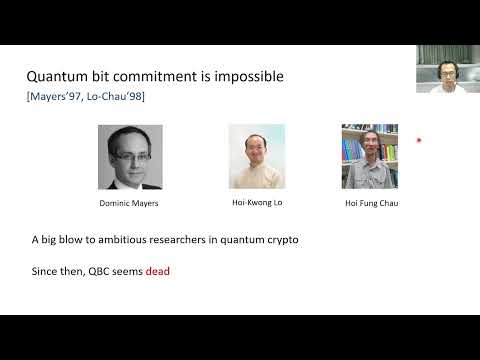CryptoDB
General Properties of Quantum Bit Commitments (Extended Abstract)
| Authors: |
|
|---|---|
| Download: | |
| Presentation: | Slides |
| Conference: | ASIACRYPT 2022 |
| Abstract: | While unconditionally-secure quantum bit commitment (allowing both quantum computation and communication) is impossible, researchers turn to study the complexity-based one. A complexity-based canonical (non-interactive) quantum bit commitment scheme refers to a kind of scheme such that the commitment consists of just a single (quantum) message from the sender to the receiver that can be opened later by uncomputing the commit stage. In this work, we study general properties of complexity-based quantum bit commitments through the lens of canonical quantum bit commitments. Among other results, we in particular obtain the following two: 1. Any complexity-based quantum bit commitment scheme can be converted into the canonical (non-interactive) form (with its sum-binding property preserved). 2. Two flavors of canonical quantum bit commitments are equivalent; that is, canonical computationally-hiding statistically-binding quantum bit commitment exists if and only if the canonical statistically-hiding computationally-binding one exists. Combining this result with the first one, it immediately implies (unconditionally) that complexity-based quantum bit commitment is symmetric. Canonical quantum bit commitments can be based on quantum-secure one-way functions or pseudorandom quantum states. But in our opinion, the formulation of canonical quantum bit commitment is so clean and simple that itself can be viewed as a plausible complexity assumption as well. We propose to explore canonical quantum bit commitment from perspectives of both quantum cryptography and quantum complexity theory in future. |
Video from ASIACRYPT 2022
BibTeX
@inproceedings{asiacrypt-2022-32492,
title={General Properties of Quantum Bit Commitments (Extended Abstract)},
publisher={Springer-Verlag},
author={Jun Yan},
year=2022
}

